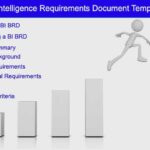The Best Fluffy Pancakes recipe you will fall in love with. Full of tips and tricks to help you make the best pancakes.
In today’s fast-paced, data-driven world, businesses are constantly facing the challenge of managing and making sense of vast amounts of data. This is where business intelligence (BI) comes in, providing organizations with the tools and insights they need to make informed decisions and stay ahead of the competition.

Introduction
The introduction will provide an overview of the importance of business intelligence in a data-driven world, highlighting its benefits and relevance to modern businesses.
What is Business Intelligence?
This section will define business intelligence and explain how it differs from traditional data analytics. It will also provide an overview of the main components of BI, including data warehousing, reporting, and analytics.
Data Warehousing
This subsection will explain the concept of data warehousing, its benefits, and how it enables businesses to manage and store large volumes of data.
Reporting
This subsection will highlight the importance of reporting in business intelligence, explaining how it helps organizations to make sense of their data and communicate insights effectively.
Analytics
This subsection will discuss the role of analytics in business intelligence, including its use in identifying patterns, trends, and anomalies in data.
Why is Business Intelligence Important?
This section will explore the benefits of business intelligence and why it is essential for businesses to leverage data effectively to remain competitive in today’s data-driven landscape.
Better Decision Making
This subsection will discuss how BI enables organizations to make better, data-driven decisions, reducing risks, and increasing opportunities.
Improved Operational Efficiency
This subsection will explain how BI can improve operational efficiency by identifying areas for optimization and streamlining processes.
Increased Revenue and Profitability
This subsection will highlight how BI can help businesses to identify new opportunities for growth and revenue generation, increasing profitability.
Competitive Advantage
This subsection will discuss how BI can provide businesses with a competitive advantage, enabling them to stay ahead of the competition and adapt quickly to changing market conditions.
Key Features of Business Intelligence
This section will outline the key features of effective business intelligence solutions, including scalability, flexibility, and ease of use.
Scalability
This subsection will explain how BI solutions must be scalable to accommodate the growing data volumes and user base of modern businesses.
Flexibility
This subsection will discuss the importance of flexibility in BI solutions, highlighting the need for customization and the ability to integrate with other tools and systems.
Ease of Use
This subsection will emphasize the importance of user-friendly BI solutions that enable non-technical users to access and analyze data easily.
Business Intelligence Trends to Watch
This section will explore the latest trends in business intelligence, highlighting emerging technologies and best practices.
Artificial Intelligence and Machine Learning
This subsection will discuss the growing role of AI and machine learning in BI, including their use in predictive analytics and data visualization.
Cloud-Based BI
This subsection will explore the benefits of cloud-based BI solutions, including scalability, flexibility, and cost-effectiveness.
Mobile BI
This subsection will discuss the growing trend of mobile BI, highlighting the importance of mobile-friendly dashboards and analytics tools.
Conclusion
The conclusion will summarize the main points of the article and emphasize the importance of business intelligence in a data-driven world. It will also provide some practical tips for businesses looking to implement effective BI solutions.
FAQs (Continued)
- What is the difference between traditional analytics and business intelligence?
Traditional analytics focuses on extracting insights from data, while business intelligence (BI) takes a broader approach to data analysis, encompassing data warehousing, reporting, and analytics. BI also emphasizes the use of data visualization tools and dashboards to enable non-technical users to access and analyze data easily.
- What are the benefits of business intelligence for small businesses?
Business intelligence can provide small businesses with a range of benefits, including improved decision-making, increased efficiency, and better insights into customer behavior. BI can also help small businesses to identify new opportunities for growth and revenue generation, enabling them to stay ahead of the competition.
- How can businesses ensure the scalability of their BI solutions?
To ensure the scalability of their BI solutions, businesses should choose a platform that can accommodate growing data volumes and user bases. Cloud-based BI solutions are often a good choice as they offer scalability, flexibility, and cost-effectiveness.
- What are some best practices for data visualization in BI?
Some best practices for data visualization in BI include using simple and clear charts and graphs, avoiding clutter and unnecessary details, and selecting appropriate colors and fonts. It’s also important to consider the audience when creating visualizations and to use interactivity to enable users to explore the data in more detail.
- What are some of the most common challenges associated with implementing business intelligence solutions?
Some of the most common challenges associated with implementing business intelligence solutions include data quality and integration issues, the need for technical expertise, and resistance to change among users. To overcome these challenges, businesses should focus on selecting the right BI solution for their needs, investing in user training, and ensuring the buy-in of all stakeholders.



